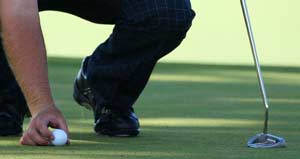The Hacker: It can be a level playing field if 'honest cheats' play cards right

Anyone who plays golf seriously is proud that the game is played to the strictest set of rules in sport but it doesn't follow that every player is fully conversant with every rule and there is hardly a round played without some debate – argument even – about an infringement.
Last week, for instance, I told the sad tale of Mac who scored 132 in a medal competition, and one of that massive total of shots was a penalty incurred when his shot from off the green stopped two inches short of the hole.
Mac took the flag out and held it with one hand while he tapped the ball in. One of his playing partners generously advised him that he had thereby committed an offence punishable by one shot.
Now, I have to confess I wasn't sure about it but I figured that if it was wrong one of my readers would swiftly point it out.
My laziness was rewarded when Geoff Fallows emailed to say that the rule had been changed and it was no longer an offence. So, Mac scored only 131 and he'll be delighted when I tell him.
By a strange coincidence, the following day I received an email entitled "Honest Cheats" which was on that precise subject of players not knowing the rules.
It came from Peter Harris, who plays off 12 at St Pierre, near Chepstow. He wrote: "In my 30 years of experience I have found that the wonderful world of golf is populated by players of all ages, sexes and cultural backgrounds who delight in the honesty displayed by self-regulation on the golf course. However, I have to say that a lot of golfers don't understand the rules and, as a result, are honest cheats because of ignorance of the rules."
Peter proposes the great idea that before every round each golfer should be given a card, or it could be incorporated into the scorecard, which plainly explains five of the more basic rules. For example:
1. Lost ball off the tee and the procedure needed to play a provisional ball.
2. Unplayable lie: where to drop the ball under penalty.
3. Water hazard: the difference between red and yellow stakes and where to drop.
4. Bunker play: what can be removed from the bunker, and whether there is a penalty for touching sand on the back swing.
5. Improving your lie; i.e. using your stance or club to feather the ground behind your ball in the rough or knocking leaves or branches off trees during your practice swing.
Peter claims this would speed up play by reducing the arguments and discussions out on the course. He points out that it would also create "a level playing field" because, at the moment, the most vociferous players – and we all know plenty of them – hold sway on rule disputes because others are uncertain.
The five printed rules could be changed regularly. It is a splendid idea and I shall certainly suggest it at my club.
Sadly, I have lost a playing companion who, for the best part of the last 20 years, has put up with me around Royal Porthcawl and who it was impossible to have an argument with on any subject.
It is not often you find a good player prepared to tolerate a hacker like me on a regular basis but John Newark was a man with unfailing politeness and patience among his many qualities.
A single-figure golfer ought to be playing with players of a similar quality, especially at Porthcawl, where the rough is merciless to the bad player. But he happily trudged into it regularly in search of my ball. At one time he gave me two shots a hole to make a game of it.
It was hardly ever enough but never did he burden me with advice, not even the usual, "Keep your bloody head down."
He used to tell me to relax, it was just a game of golf. And highly enjoyable games they were. Happy memories.
Tip of the week
No 73: Best balance
As I have mentioned before in some of my previous tips, balance is absolutely vital for hitting good golf shots.
Expert golfers will often practise on a half-moon pipe (a more unstable grounding) to improve their balance.
For every shot you play in golf, you need your weight to be on the balls of the feet. Whether it's striking a putt or hitting a full drive, having the weight on the balls of the feet will make you more grounded and athletic.
For the best way to achieve good balance, set up to the ball and then grip the ground hard with your toes for a few seconds, then simply release the pressure and you will find the weight right in the balls of the feet.
Practise this for every shot you play and you will soon find that your ball-striking will improve dramatically.
Simon Iliffe is head professional at Bramley Golf Club, Surrey. www.theshortgame.co.uk
Subscribe to Independent Premium to bookmark this article
Want to bookmark your favourite articles and stories to read or reference later? Start your Independent Premium subscription today.

Join our commenting forum
Join thought-provoking conversations, follow other Independent readers and see their replies